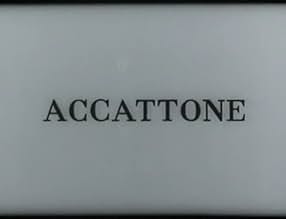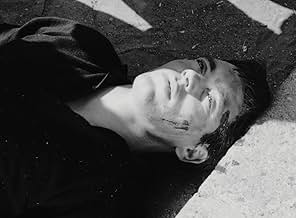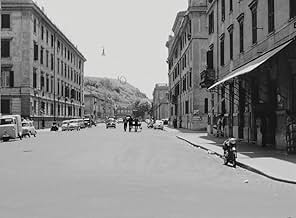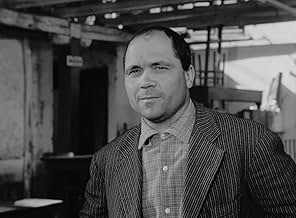AVALIAÇÃO DA IMDb
7,6/10
11 mil
SUA AVALIAÇÃO
Um cafetão sem outros meios para se sustentar vê sua vida sair do controle quando sua prostituta é mandada para a prisão.Um cafetão sem outros meios para se sustentar vê sua vida sair do controle quando sua prostituta é mandada para a prisão.Um cafetão sem outros meios para se sustentar vê sua vida sair do controle quando sua prostituta é mandada para a prisão.
- Direção
- Roteiristas
- Artistas
- Indicado para 1 prêmio BAFTA
- 3 vitórias e 4 indicações no total
Avaliações em destaque
The term 'accattone' is an old Italian phrase intended to brand a character with an aura of absolute repulsiveness. Thieves and low-lives would usually coin the term when referring to a character that is so despicable, so without moral or social decency, that even the criminals would look down upon them. In Pier Paolo Pasolini's incredibly assured debut, 'Accattone' is Vittorio (Franco Citti), a low-life pimp who when he is not sitting around squeezing money out of people with wagers and tricks, is abusing his lone prostitute who cannot work after breaking her leg in a motorcycle accident. It's a tale of a despicable scumbag, set during a dark period in Rome, where men viewed working as slave labour, and enjoyed themselves by beating prostitutes to within an inch of their life.
It's an incredibly bleak tale, told without sentiment and moral preaching. Pasolini's doesn't seem to want to dictate a larger social message, or make Accattone a sympathetic character who is the victim of political or social oppression, but to simply tell a tale, a real tale, of a group of low-lives who are the way they are because they want to be. After all, the true soul of neo-realism is to portray life the way actual people experience it, not to romanticise or sentimentalise it with the kind of scripts Hollywood are responsible for. Of course, many neo-realist directors would almost betray the genres roots the kind of way only auteurs can manage, and Pasolini would go on to make more surrealistic and interpretive movies, but this is true neo-realism without any kind of magical reward for the audience, or a moment of redemptive enlightenment for its protagonist. It's a story of grit, one that is thrilling and fascinating in equal measures, and with the stamp of a great director.
The film I felt it more akin to is Luis Bunuel's Los Olvidados (1950), a film of equal disregard for cinematic wonder, and one that is also punctured by an impressive dream sequence. Whilst Bunuel's sequence came around the middle section, and was a burst of absolute surrealistic beauty amongst social depravity, Accattone's comes during its climax; a strange, moody set-piece in which Accattone witnesses his own funeral, amongst other things. At first I felt like it was almost betraying what came before, but then I realised it was Pasolini's way to try and get into its characters head, and the outcome is as confusing and as futile as Accattone himself. Though I haven't seen much of Pasolini's work, this is the best I've seen, beating even the distressing brilliance of his final film Salo (1975). Though he would move away from neo-realism, Pasolini achieves more with his debut than some of the greats of the genre would manage to achieve.
www.the-wrath-of-blog.blogspot.com
It's an incredibly bleak tale, told without sentiment and moral preaching. Pasolini's doesn't seem to want to dictate a larger social message, or make Accattone a sympathetic character who is the victim of political or social oppression, but to simply tell a tale, a real tale, of a group of low-lives who are the way they are because they want to be. After all, the true soul of neo-realism is to portray life the way actual people experience it, not to romanticise or sentimentalise it with the kind of scripts Hollywood are responsible for. Of course, many neo-realist directors would almost betray the genres roots the kind of way only auteurs can manage, and Pasolini would go on to make more surrealistic and interpretive movies, but this is true neo-realism without any kind of magical reward for the audience, or a moment of redemptive enlightenment for its protagonist. It's a story of grit, one that is thrilling and fascinating in equal measures, and with the stamp of a great director.
The film I felt it more akin to is Luis Bunuel's Los Olvidados (1950), a film of equal disregard for cinematic wonder, and one that is also punctured by an impressive dream sequence. Whilst Bunuel's sequence came around the middle section, and was a burst of absolute surrealistic beauty amongst social depravity, Accattone's comes during its climax; a strange, moody set-piece in which Accattone witnesses his own funeral, amongst other things. At first I felt like it was almost betraying what came before, but then I realised it was Pasolini's way to try and get into its characters head, and the outcome is as confusing and as futile as Accattone himself. Though I haven't seen much of Pasolini's work, this is the best I've seen, beating even the distressing brilliance of his final film Salo (1975). Though he would move away from neo-realism, Pasolini achieves more with his debut than some of the greats of the genre would manage to achieve.
www.the-wrath-of-blog.blogspot.com
Pasolini's first film "Accatone" is exactly as one would expect a typical Pasolini film to be: wreathed in raw violence, and shot with a brilliant sense of poetic slash brutal realism, reminiscent of the neo-realism era, and perhaps, if not for sure, a semi-autobiographical portrait of life in the streets of Rome's peripheries. "Accatone" is, at its best, a chunk of life, which Pasolini managed to extract not as it initially was, but dramatically filtered through his own personal lyrical gaze. Gangs, prostitutes, lies and deceit lie in this film's core. A sense of irresponsible opportunism is seen in this film, almost no regrets for the past and no fears for the future. In fact, the movie's tragic hero, Vittorio Accatone, is a dark alter-ego of yet another favored Italian movie character, embodied only a year before by Marcello Mastroianni in "La Dolce Vita". Perhaps, in this case, Accatone was not a party animal journalist who sought ephemeral pleasure in social middle-class gatherings and women, but the spirit is, by itself, maintained astonishingly faithfully: Accatone is no longer a protagonist in Pasolini's movie, doomed to descend lower and lower in social class, losing both his dignity, his social acceptability and his profound "style", but a symbol, a metaphor for Pasolini's own political beliefs. Under this figure of a brute, behind the otherwise repelling image of a short dirty man with a sly smile and a peculiar walk, lies the failure of post war Italian government, a government which, according to this movie's subtext, strove so hopelessly to attain social and economical success for Rome's population, and somehow neglected or marginalized Rome's peripheries, causing people like Accatone and his girlfriends to result in prostitution and theft. A kind of pretension and make-belief well being which was also visible, at the time, in America. Yes, Accatone is the result of this American Dream's pastische.
Yes, it has some not so good scenes, bad lightning and it´s far from Passolini's beautiful aesthetic, but still, this movie is a masterpiece for what it represents. A brilliant start for a genius career, powerful and great story, and Pasolini's essence all over.
Accattone announces a director, Pier Paolo Pasolini, who is a haunting/haunted poet from his surroundings and realist, someone who wants to put his eye on the world without flinching on the details of how 'ordinary' (of the street) people speak and interact, how raw and uninhibited they can be, these being the guys on the streets who are vulgar and coarse at best and at worst are abusers of women. But at the same time what one comes away with is poetry in documentary form - it's another level of neo-realism, a little more like an urban story than a post-war treatise that still throbs with the importance of those in poverty. Anytime I hear the song Matthaus Passion I'll immediately contemplate those harsh images of Vittorio Accattone, being cast aside by his family for being a pimp, or that poor girl being beaten at night by that gang of men, which is something that elevates such hard scenes into art.
Vittorio Accattone is the main character- charming and attractive, and also a perpetual scoundrel who also is a total outcast. He has a wife and kid(s), but is estranged from them by choice - her choice most likely - and he finds himself in big trouble once his main prostitute, Maddalena, is sent to prison for a bad informing job. It's after this we see Accatone on his potential path to redemption when he meets a supremely sweet and average girl from out of town, Stella, who he may eye as a new girl on the street... or perhaps not, as his attachment to her grows more and stronger, in spite of what and who are around him every day and night in the dirty province.
He's someone we want to root for in being a better person, or, perhaps even, better at what he does. He's a tragic anti-hero in a New-Wave sort of sense, cool looking and aspiring to be modern and cool (and maybe he is, up to a point), but also poor and uneducated, so much so that being on the fringe and being called "PIMP!" is what he's been reduced to by default. The performance from Franco Citti is one thing that keeps the viewer locked in: he's so good here because he looks plucked right off the street by Pasolini, as would turn to be his method with choosing most of his 'actors' on camera. There's a reality to his interactions with his friends (so called) or his business associates. Some of their dialog and tones of speech aren't refined or look trained. At one point when Citti's Vittorio breaks down in tears- a sudden turn from a previous scene showing more attitude- is authentic, even as another actor could have possibly played it "better".
It is what Pasolini wants, and he gets it, much in the same way he also gets a view of this side of Rome in a way that hasn't been seen before up until this time. His DP Tonino Delli Colli shoots simply often, and sometimes not so much - there's complexity, say, to a tracking shot in front of Accatone talking to a girl who is on a bicycle, or when we see the horrorshow of the men taking Maddalena at night in the middle of nowhere, the only lights starkly coming from the car. The effect is nothing short of a slow-burn. While a few of the actors do fall a bit too flat, and some scenes come close to lagging around (the editing might be the most significant flaw here), the raw emotion and fire in the subject matter keeps things fascinating. You want to see what happens with this young guy, and it's his tragedy that gets us absorbed, even as the Bach music abstracts the sorrow, and agonizing poetry of the streets, and it's this that makes it a classic.
Only downside I must mention - if you live in the US, or happen to watch it on a DVD or online from Walter Bearer films, the print is just not very good. It's the sort where the white subtitles drop in and out of view depending on who's standing where in a frame. It's not totally detrimental, but some scenes become hard to follow due to the poor quality of the subtitles with the print. This, if for no other reason, demands the film receive the Criteron treatment.
Vittorio Accattone is the main character- charming and attractive, and also a perpetual scoundrel who also is a total outcast. He has a wife and kid(s), but is estranged from them by choice - her choice most likely - and he finds himself in big trouble once his main prostitute, Maddalena, is sent to prison for a bad informing job. It's after this we see Accatone on his potential path to redemption when he meets a supremely sweet and average girl from out of town, Stella, who he may eye as a new girl on the street... or perhaps not, as his attachment to her grows more and stronger, in spite of what and who are around him every day and night in the dirty province.
He's someone we want to root for in being a better person, or, perhaps even, better at what he does. He's a tragic anti-hero in a New-Wave sort of sense, cool looking and aspiring to be modern and cool (and maybe he is, up to a point), but also poor and uneducated, so much so that being on the fringe and being called "PIMP!" is what he's been reduced to by default. The performance from Franco Citti is one thing that keeps the viewer locked in: he's so good here because he looks plucked right off the street by Pasolini, as would turn to be his method with choosing most of his 'actors' on camera. There's a reality to his interactions with his friends (so called) or his business associates. Some of their dialog and tones of speech aren't refined or look trained. At one point when Citti's Vittorio breaks down in tears- a sudden turn from a previous scene showing more attitude- is authentic, even as another actor could have possibly played it "better".
It is what Pasolini wants, and he gets it, much in the same way he also gets a view of this side of Rome in a way that hasn't been seen before up until this time. His DP Tonino Delli Colli shoots simply often, and sometimes not so much - there's complexity, say, to a tracking shot in front of Accatone talking to a girl who is on a bicycle, or when we see the horrorshow of the men taking Maddalena at night in the middle of nowhere, the only lights starkly coming from the car. The effect is nothing short of a slow-burn. While a few of the actors do fall a bit too flat, and some scenes come close to lagging around (the editing might be the most significant flaw here), the raw emotion and fire in the subject matter keeps things fascinating. You want to see what happens with this young guy, and it's his tragedy that gets us absorbed, even as the Bach music abstracts the sorrow, and agonizing poetry of the streets, and it's this that makes it a classic.
Only downside I must mention - if you live in the US, or happen to watch it on a DVD or online from Walter Bearer films, the print is just not very good. It's the sort where the white subtitles drop in and out of view depending on who's standing where in a frame. It's not totally detrimental, but some scenes become hard to follow due to the poor quality of the subtitles with the print. This, if for no other reason, demands the film receive the Criteron treatment.
In the poor periphery of Rome of the 60's, the despicable caftan Vittorio "Accattone" Cataldi (Franco Citti) is maintained by the hooker Maddalena (Silvana Corsini), spending the time with his useless idle friends. When the prostitute is arrested for perjury, the pimp "Accattone" has nobody to support him, but he seduces the naive worker Stella (Franca Pasut) and she becomes a whore. However, Accattone has a crush on Stella and decides to find a way to support her, with tragic consequences.
"Accattone" is the stunning debut of the great director Pier Paolo Pasolini. He returns to the theme of the misery of Italy in the postwar, explored in many Italian neo-realist movies such as Fellini's "Le Notti di Cabiria" (1957) and Visconti's "Rocco e i Suoi Fratelli" (1960), and magnificently shows the lifestyle of great part of the population in Italy, its lower class, with lack of perspective, starvation, prostitution and unemployment. Considering that this movie is also the debut or the beginning of the career of most actors and actresses, it is amazing how Pasolini was able to make such gem. My vote is nine.
Title (Brazil): "Accattoni Desajuste Social" ("Accattoni Social Maladjustment")
"Accattone" is the stunning debut of the great director Pier Paolo Pasolini. He returns to the theme of the misery of Italy in the postwar, explored in many Italian neo-realist movies such as Fellini's "Le Notti di Cabiria" (1957) and Visconti's "Rocco e i Suoi Fratelli" (1960), and magnificently shows the lifestyle of great part of the population in Italy, its lower class, with lack of perspective, starvation, prostitution and unemployment. Considering that this movie is also the debut or the beginning of the career of most actors and actresses, it is amazing how Pasolini was able to make such gem. My vote is nine.
Title (Brazil): "Accattoni Desajuste Social" ("Accattoni Social Maladjustment")
Você sabia?
- CuriosidadesThis was Bernardo Bertolucci's first work in movies. He was an assistant director.
- Erros de gravaçãoThe shadow of the camera is clearly visible on Accattone's shirt when he walks away towards the camera after the fight with Ascenza's Brother.
- Citações
Vittorio "Accattone" Cataldi: Call me Accattone. There are lots of Vittorios but I'm the only Accattone.
- Versões alternativasThe VHS and DVD versions produced by Water Bearer Films are listed as running 116 minutes, suggesting that this print is four minutes shorter than the original release.
- Trilhas sonorasSt Matthew Passion
Composed by Johann Sebastian Bach
Principais escolhas
Faça login para avaliar e ver a lista de recomendações personalizadas
- How long is Accattone?Fornecido pela Alexa
Detalhes
Bilheteria
- Faturamento bruto mundial
- US$ 2.865
- Tempo de duração1 hora 57 minutos
- Cor
- Mixagem de som
- Proporção
- 1.37 : 1
Contribua para esta página
Sugerir uma alteração ou adicionar conteúdo ausente
































